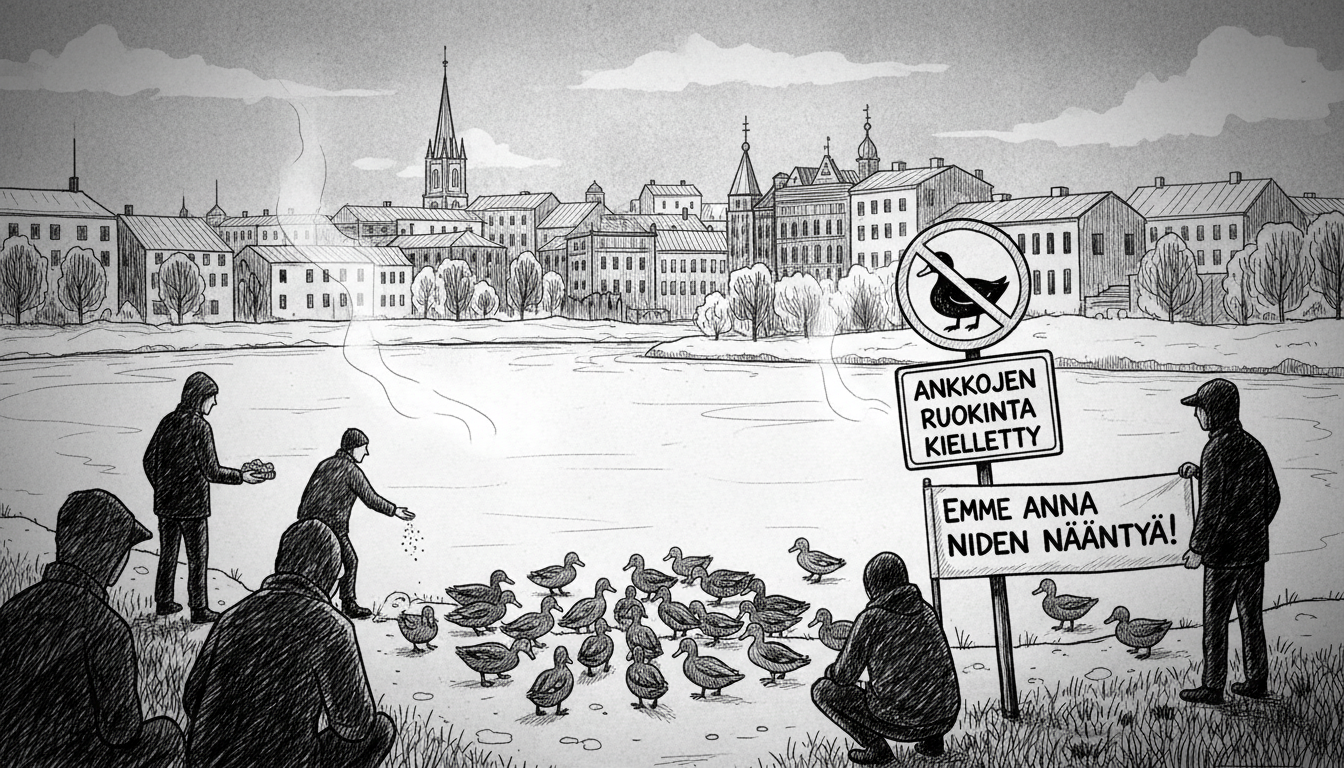A heated controversy over wild duck feeding has erupted in the northern Finnish city of Kajaani, with local activists vowing to continue feeding the birds despite a complete ban by city authorities. The conflict pits veteran politicians and dedicated volunteers against municipal officials in a battle over animal welfare and urban regulations.
Veteran parliament member Pentti Kettunen expressed urgent concern for approximately 400 ducks that traditionally winter in Kajaani. The city's environmental technical board implemented a total ban on feeding wild birds across all city planning areas in August. Kettunen warned that without intervention, the ducks face starvation and freezing when snow and ice arrive.
"If we want these ducks to survive the winter without starving or freezing to death, we need solutions now," Kettunen stated. He emphasized the urgency as frost and snow could reach northern Finland within weeks.
Local activist Keijo Nevaranta leads a group that has continued feeding ducks despite the prohibition. Nevaranta declared his intention to maintain the same approach as last winter. "I've said that when there's snow on the ground and the lakes are frozen, and the ducks come to the city, we will start feeding," he explained. Nevaranta expressed willingness to face legal consequences, stating he would "go to prison for the birds if necessary" and advocating for civil disobedience.
The feeding tradition spans approximately 70 years along the Kajaani River. Until 2011, the city primarily managed duck feeding. When longtime municipal employee Vilho Kallio retired after decades of service, the city discontinued the program. Kallio then continued voluntarily for another decade before retiring from the task at age 80, citing the physical demands.
City officials defended the ban by citing rat infestation risks and bird flu concerns. City engineer Matti Nousiainen acknowledged understanding the feeders' concerns but emphasized respecting official decisions. "I respect their activities, but I hope they would also respect the decisions that have been made and have legal force," Nousiainen said.
Kettunen challenged the city's reasoning, noting that no bird flu cases were detected in Kajaani during Finland's 2023 outbreak. "These Kajaani ducks have lost their migration instinct and didn't get infections," he argued. "If they had migrated and returned, they might have brought bird flu to Kajaani."
Nevaranta also dismissed rat concerns, claiming no rodents have ever been seen in the feeding area due to its distance from residential buildings.
The conflict has progressed through multiple legal channels. A citizens' initiative to reverse the ban was filed in June, but the city board declared the matter concluded in September. Kettunen then demanded administrative court intervention, but the Northern Finland Administrative Court declined to investigate the complaint in late October.
Legal experts suggest the appeals process is nearing its end. Emeritus Professor of Criminal Law Matti Tolvanen explained that the city board lacks authority to overturn the environmental technical board's decision in this case, meaning "the final result just has to be endured."
Current environmental technical board chairman Antero Kyllönen doesn't anticipate mass duck deaths. "Most will migrate away. If there's no food, they'll go somewhere," Kyllönen stated. He expressed skepticism about long-term volunteer sustainability, questioning who would take clear responsibility over the long run.
Nevaranta countered that volunteers have maintained the feeding for nearly fifteen years, demonstrating consistent commitment beyond temporary enthusiasm.
The standoff highlights broader questions about urban wildlife management, citizen activism, and municipal authority in Finnish communities. As winter approaches, both sides remain entrenched in their positions, with ducks caught in the middle of this human conflict over their survival strategy.
This situation reflects Finland's unique relationship with nature, where traditional practices sometimes collide with modern urban regulations. The outcome could set precedents for how other Nordic municipalities handle similar wildlife management dilemmas involving dedicated citizen activists and established animal populations.

